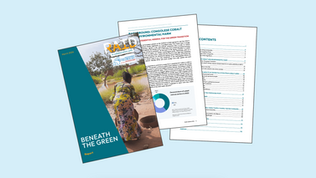
Environment and Sustainable Development
It has been a great pleasure working with ILP on the emergency mobilisation campaign to stop a repeal of the Kenyan Forest and Conservational Management Act. A very dedicated team indeed. We remain grateful for ILP’s support.
Jabes Okumu
Programmes Manager
East African Wild Life Society
What We Do
We challenge economic injustice caused by environmental damage, biodiversity loss, deforestation, illegal resource trafficking, climate change and conflicts over natural resources, by helping affected communities hold actors to account, defending rights, negotiating equitably, and halting illegal environmental acts that violate human rights and cause dispossession.
We build the capacity of governments to better enforce environmental laws, protect environmental rights, and use climate finance instruments to promote a green economy. We advocate for a just transition to a green economy that upholds human rights and does not disproportionately burden the marginalised.
Why We Do It
Demand for land and natural resources is causing acute stress on the environment and on human populations. This environmental degradation not only threatens the planet but also infringes upon fundamental human rights, exacerbating discrimination and inequality.
Enforcement of laws and policies is critical; yet corruption and illicit financial flows facilitate evasion and obstruct stronger national and international regimes. ILP’s approach to environmental crime and corruption, such as wildlife trafficking, natural resource theft, pollution, and deforestation, addresses both ‘supply’ and ‘demand’, promoting systems of prevention, effective enforcement, and the pursuit of accountability.
How We Do It
We identify opportunities with our partners to change law, policy and practices that both build good practices in environmental issues and sustainable development, and clearly delineate bad practices, and their consequences.
We assist with the drafting and analysis of laws and policies that promote climate change adaptation and mitigation measures and green investments, in order to ensure that such measures do indeed support sustainable development.
We provide legal advice and training on alternative legal or accountability remedies against governments or corporations for environmental crimes, including how sanctions can be applied to these actors, or how anti-money laundering laws can be used to prosecute wildlife trade.
We support communities to engage with governments and companies regarding development projects to ensure that they align with communities’ land and environmental rights.
We provide technical support to policy makers and civil society to enable the adoption of progressive fiscal policies that will enable states to develop more sustainable economies.






















